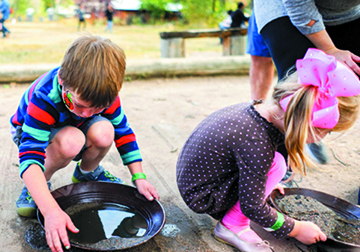
Comrade Brewing






Multiple Sites Finishing Up But Only A Couple Commencing; Stunning Newly Built Structures Opening In The District For Fall
by Glen Richardson

The pandemic and a weakening economy find Cherry Creek’s construction sites still turning shovels and swinging hammers, but the pace has slowed and few new projects are expected to sprout up. Following eight straight years of new construction, owners, developers, contractors, subcontractors and the supply chain are feeling the shock.
Normally it’s rare for district developers-builders to slow down construction activity. But these aren’t normal times, and the pandemic economy has given rise to a noticeable work cutback. The structure of demand is changing: Fewer hotels are being proposed due to less business-leisure travel. Online shopping is shrinking the demand for retail space and the need for offices is slowing because of remote working.
Multiple projects are finishing up in Cherry Creek plus a couple have commenced construction. Residents and district shoppers can expect those projects to be completed. It is new projects that have been proposed in the district that are likely to see terminations of parties or entire projects. Given the hotel outlook, the AC Marriott in Cherry Creek is likely to be delayed or the site could go up for resale. The Sunridge Hotel Group project is proposed for seven-stories, 150-rooms.
Westside Wait
Redevelopment of Cherry Creek’s west end has been the slowest to take off. Completion of the 260 North office-retail project at Josephine St. and East 3rd Ave. and makeover of the former Inn at Cherry Creek opening as The Clayton at 233 Clayton St. in March of 2021 are notable exceptions.

Broe Real Estate Group which owns the bulk of the east side of Clayton St. announced a year ago it would demolish several structures to make way for two new office buildings. Existing two-story structures at 200 and 210 Clayton are to be replaced with an eight-story office building with ground-floor retail. The adjacent four-story building it owns at 216 Clayton would remain but the two-story parking garage to the north would be replaced with a seven-story office building and ground-floor retail. Broe’s headquarters is at 252 Clayton and the firm has deep pockets. Thus the massive project will likely come to fruition but demolition isn’t expected to begin until next year with completion two-five years away.
The promised Clayton Lane Investors redevelopment of the west end of Cherry Creek between 1st and 2nd Ave. from Josephine to Detroit St. is in limbo again. The Invesco Real Estate-Broomfield partnership project isn’t likely to break ground in the next 12-14 month. Completion that would include demolishing the former Sears store that has been vacant since 2015 isn’t likely in the next several years. Should the venture be terminated look for the Nichols Partnership — Clayton Lane’s original developer — who just bought back a portion of the Whole Foods Garage for $6 million — to take over the project.

New For Fall
Newly completed projects scattered through the fashionable neighborhood are beginning to open for fall. The project known as 260 North has finally opened, creating the west end’s first high-end, mixed-use space. Situated adjacent to the BMC built MOXY and Halcyon Hotels — the only other new westside structures — it is a compelling building with a stepped-up design. Located on the corner of 3rd and Josephine streets, it adds office, retail and parking space while allowing daylight into the streetscape.
On the east end, the just completed modernistic 88,000-sq.-ft. UC Health Cherry Creek has opened. With an all-glass façade, it stands out alone on East 1st Ave. as most of the surrounding buildings are heavy with earth tones and masonry. The health center offers primary care, state of the art imaging, a surgery center and comprehensive oncology treatment.
Over in the Cherry Creek Triangle, two major multi-family projects are also open. Between the step down, brickwork and landscaping, Gables Cherry Creek II helps reduce the harshness of East Alameda Ave. Gables Vista, rising 12-stories, is one of the tallest in the triangle. All together the three Gables projects have added 579 homes in the district.
On The Rise
Two projects, both BMC developments, are currently under construction in the district. Newest is the 240 Saint Paul project to be anchored across the first three floors by the Equinox Fitness Club. Most of the office space is pre-leased and at last report half of the 12,000-sq.-ft. of retail space had been rented. Construction is anticipated to take at least 14 months, with completion in summer-early fall of next year.

Renamed The Clayton, Matt Joblon signed a 99-year ground lease on the 233 Clayton St. property in the fall of 2017. Since renovation started a year ago, BMC is spending $30 million to add onto the property that’s expected to open next March.
What will make the project unique in Cherry Creek is Joblon’s goal to create a “real culture center.” In addition to 37 hotel rooms, the six-story building will feature 12,000-sq.-ft. of “hip retail” on the ground-floor plus scores of music, culinary and art venues for entertainment, exploration and enjoyment.
Projects On Horizon
Despite the district’s construction slowdown, there are several new projects on the horizon in Cherry Creek. They range from office buildings to apartment complexes, two potential hotels plus an independent living community for seniors.

Most likely to begin construction is the 2nd Ave. & Adams project where a two-story office building and a single-family home have already been cleared. Purchased by Blair Richardson, the 0.29-acre site would feature an all-glass building with ground floor retail plus four levels of office space. When it is developed it will extend the existing stretch of retail on East 2nd Ave. further east.
Due to the project’s nature, a proposed seven-story, 136-unit senior living project could also break ground next year. Named Solterra Senior Living, the site is near the intersection of Alameda Ave. and Colorado Blvd. A self-service car wash was recently demolished at the site to make way for the project. The infill site at 235 Fillmore that has set vacant for several years has been purchased by BMC, making development more likely. An office building with ground-floor retail is proposed.

by Mark Smiley

Fall into some old-fashioned fun at Four Mile Historic Park’s annual Pumpkin Harvest Festival. The festival is set for Friday, October 2, and Saturday, October 3, from 9 a.m. to 8 p.m. and Sunday, October 4, from 9 a.m. to 6 p.m. Pumpkin Harvest will require advanced purchase, timed tickets. A ticket guarantees you a 90-minute experience in the 12 acre park.

Activities for all ages include craft kits, pioneer games, live music, photo booth, pumpkin walk, pumpkin decorating, demonstrations and more. Additional activities available for purchase include Pumpkins from the 4MHP Pumpkin Patch, Tasty Treats for Purchase from partnered Food Trucks, Fall-Inspired Beverages.
Sponsorships are still available and include a 10’x10’ tent, choice of location, access to power, listing on event collateral, and complimentary tickets to the festival. Visit FourMilePark.org for more information or to fill out a sponsorship form.

The Pumpkin Harvest Festival admission is $15 and Children 3 and under are free. Members have exclusive access to a free preview night on Thursday, October 1, 2020. There is still time to purchase a membership at www.fourmilepark.org/get-involved/membership.

Arts & Venues Shutters Renowned Facilities, Lays Off Staff; Drastic Cutbacks Loom For The Upkeep Of City Streets, Parks
by Glen Richardson
Even as businesses have reopened helping to jumpstart the Cherry Creek Valley economy, it has come too late for the City & County of Denver. An unprecedented crisis is brewing in city government as tax revenue has fallen off a cliff.

Sounding the alarm this month that Denver is facing a fiscal reckoning of apocalyptic proportions is Arts & Venues, the City & County of Denver agency responsible for operating the Cherry Creek Valley’s most renowned facilities.
Effective this month through Jan. 2, 2021, it is shutting down Red Rocks Park & Amphitheatre, the Colorado Convention Center, the McNichols Civic Center Bldg., the Denver Coliseum plus the Denver Performing Arts Complex (DCPA) which includes the Ellie Caulkins Opera House, the Buell Theatre and Boettcher Concert Hall. The announcement includes full-time or partial furloughs of all 67 employees. The Coliseum and Convention Center will remain operational only for coronavirus related programs.
Cultural Crash
When the pandemic hit, the agency cut its expenses by 46% and moved capital improvement funds into the operating budget. “However, these prudent measures are not enough to sustain the agency if the fallout from the pandemic continues through 2021,” Executive Director Ginger White Brunetti declared in making the decision.

In an August report, Arts & Venues said Denver’s creative industries lost $1.4 billion in sales revenue and 29,840 jobs between April 1 and July 31. Red Rocks, in particular, has turned from a reliable cash-generator to a gaping hole in not only Arts & Venue’s budget projections, but those of promoters such as AEG Presents Rocky Mountains, which books the majority of Red Rocks’ 150-plus annual concerts. Bottom line: It’s taken fewer than six months to wipe out one-third of the gains Denver’s cultural sector had made in the last decade.
“It’s hoped that by pausing things now, at a time we know our venues won’t be open, Arts & Venues can be in a financial position to reopen quickly once live entertainment returns,” explains Brian Kitts, Director of Marketing & Communications.
A $227 Million Deficit
There are no ifs, ands, or buts about it, Denver’s economic reckoning has arrived and city departments will have to take major steps to try and stay afloat through next year. The pandemic recession is eroding the city budget in many insidious ways: Lodgers tax revenue has plummeted 66.4%, sales tax revenue declined 12.3% while general fund revenue has slumped 10.6%.

Predicted to be down by $180 million in June, the city now faces at least a $227 million budget shortfall. The city has added eight mandatory unpaid furlough days for all city employees and requiring budget cuts across all city agencies, currently targeted at $185 million.
Beginning this month City Council will begin hosting hearings on budget proposals by city agencies. Council members can propose amendments to the budget. The mayor then must submit a final 2021 budget for adoption.
Topping Great Depression
The 2020 city budget included projections that the general fund would increase by 2% — the main budget area under the mayor’s control. That prognosis would have created the largest general fund in the city’s history. In reality it is already down 10.5%, driven by the sales tax and lodgers’ tax — both down significantly.
The lodgers’ tax has dropped by 66.4% so far this year and sales tax toward the General Fund has declined by 16.8%. Both of those figures are much steeper declines than the city saw during the Great Recession.
The crisis has arrived faster and the damage will be more severe than that of the 1930s Great Recession. The fact administrators and bureaucrats have become accustomed to a constant ramped-up expansion in the past few years will make it seem even worse. Nonetheless, impact from cuts will be felt far into the fiscal year ahead.

Streets, Parks Hit
The fiscal reckoning that shut down Arts & Venues, is set to hit Parks & Recreation and Transportation & Infrastructure departments the hardest as the 2021 budget is hammered out by city council. Mirroring the Great Recession, the budget of Parks & Rec. will take at least a 25.34% cut in 2021. With more than 6,200 acres of parkland, 29 recreation centers, 309 athletic fields plus other amenities it’s a horrendous hit. Moreover, the agency has already adopted $2 million in cost cutting measures.
Planting of flower beds has been cut by 50%. Likewise, litter pickup and trash removal in most parks has also been cut 50%. Mowing of parks and athletic fields has been slashed from weekly to two or three times per month as staff is available. Finally, use of the irrigation systems — raw water, reuse and potable water systems — is now based on water source cost, least to most.
Transportation & Infrastructure — the new department launched this year with a thousand projects in its capital budget — is projected to take a 23.75% 2021 budget cut. Both the agency’s maintenance and wastewater management group had $150 million budgets. Previously known as the Department of Public Works, the agency plans, designs and builds the city’s infrastructure, aka streets, bridges, overpasses and storm sewers. They also fill potholes, handle parking enforcement and plow streets after snowstorms.
Budget Showdown
The Hancock administration has significantly expanded the size of the city workforce since taking office in 2011. Dozens of new offices and initiatives have been added. Even with the latest shutdowns and layoffs, the mayor is proposing a $71.3 million new Housing Stability Department and also refuses to cut $11.4 million in new bike lane construction.

Normally city council makes only minimal changes in the mayor’s proposed budget. Councilwoman Candi CdeBaca forewarns, however, that she’s prepared to fight the administration’s budget.
Beyond this year, the pandemic economy will continue to weigh heavily on the city’s outlook. The likelihood remains for elevated unemployment levels well into 2022. Visit Denver expects lodgers’ tax collections to remain below 2019 levels into 2022. Property taxes payable in 2022 are likely to be calculated off lower commercial valuations — business closures, retail-office vacancies — and lower residential assessed values.